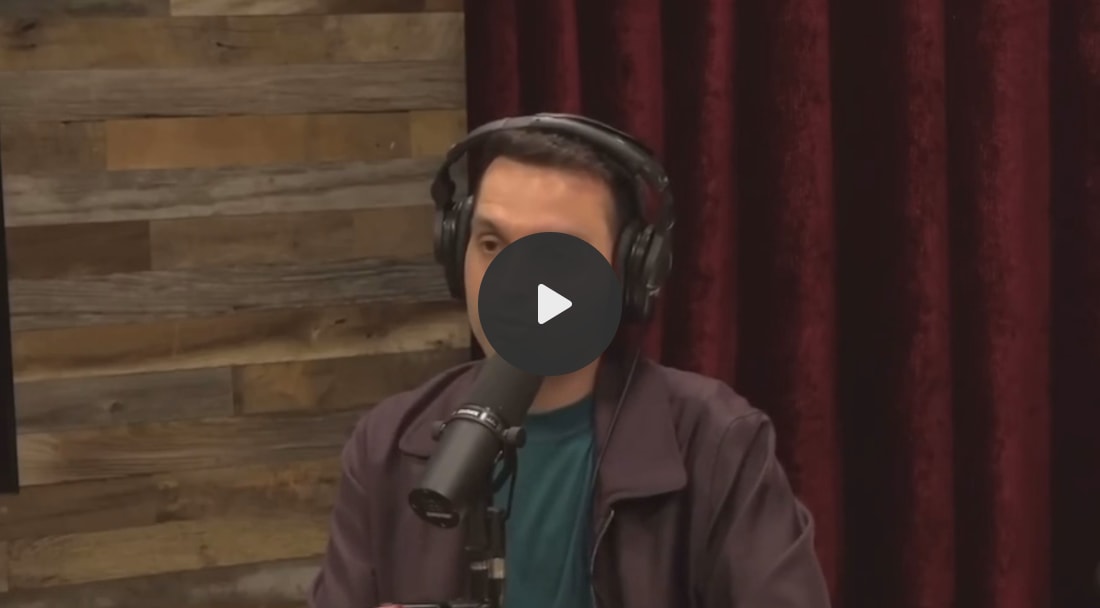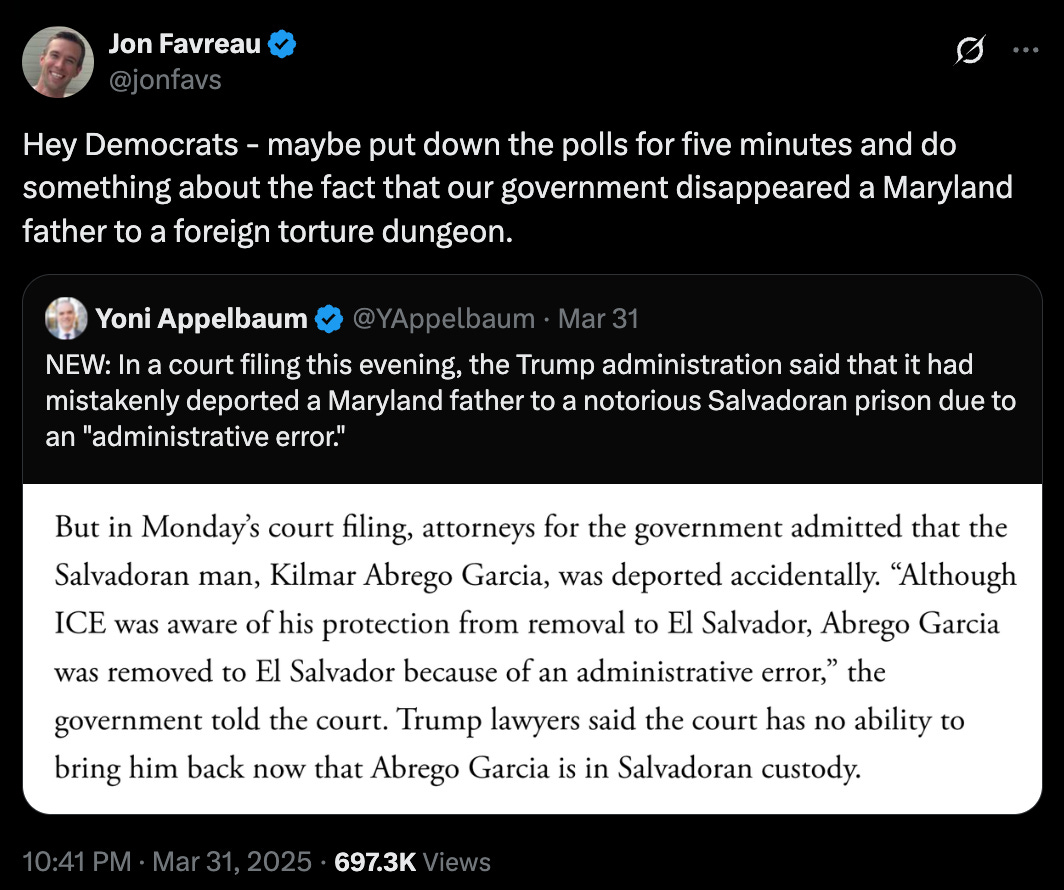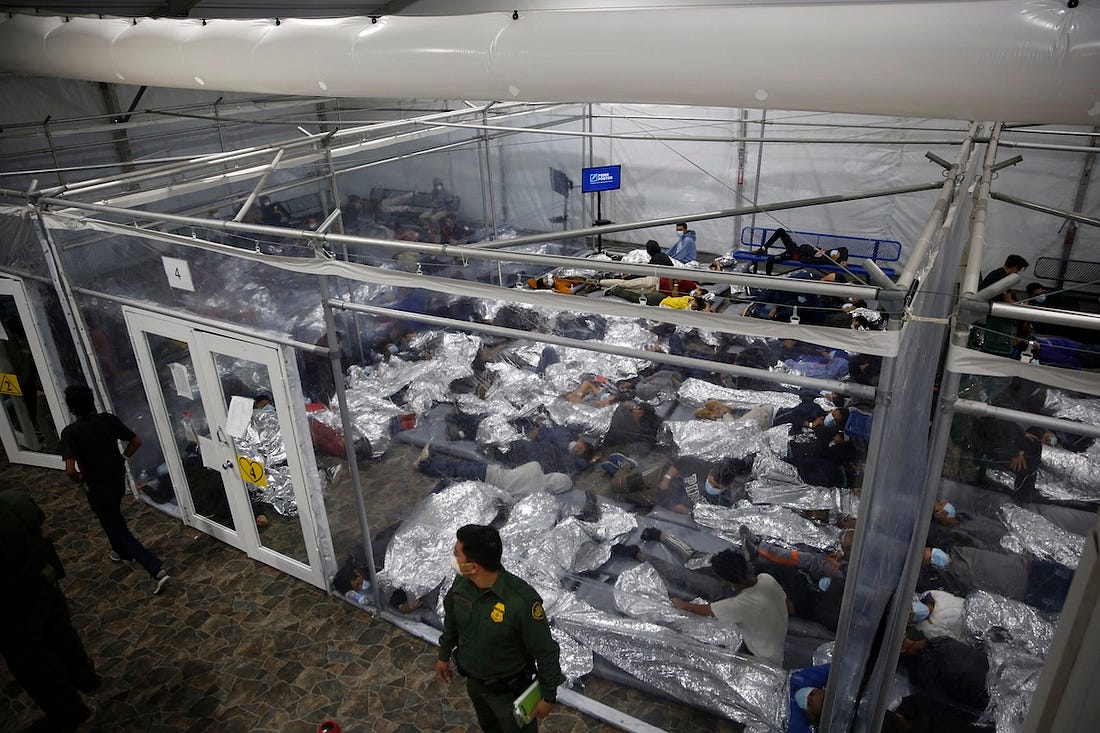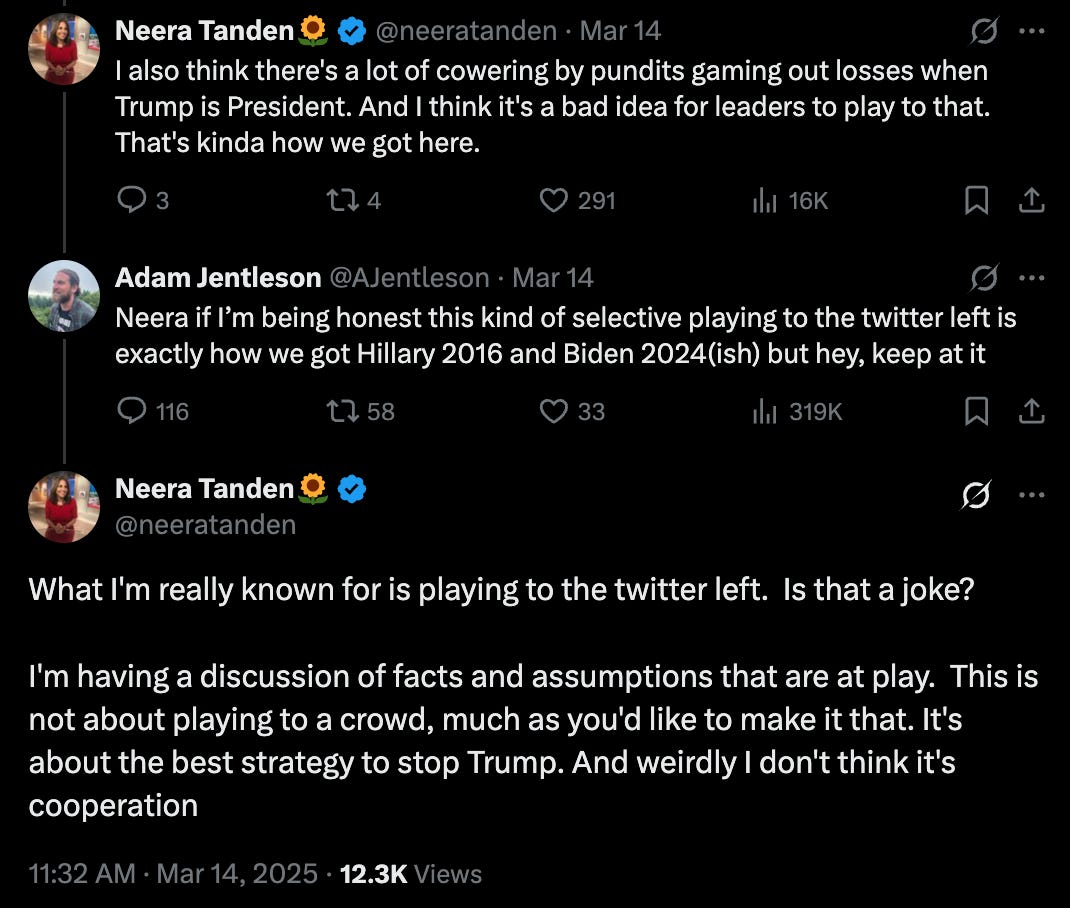|
 |
Thank you sincerely for subscribing to Off Message. I hope you’ll consider upgrading to a paid membership with this 40 percent discount, good through the end of the week.
Competition is stiff, and worse may be yet to come, but at the end of week 11, we’re face to face with Donald Trump’s most galling dictatorial power grabs.
The big one this week is tariffs, at least for as long as they stick around.
They’ve thrown the American and global economies into turmoil and ended our status as a guarantor of international trade, perhaps forever.
The only legible purpose of the tariffs is for Trump to arrogate more power to himself: so that nations and corporate leaders and labor unions come begging him for relief, and so that he can shake them down
We know that’s the main goal for several reasons, but the most transparent is that the formula Trump’s administration used to set these tariffs is nonsense. It’s demonstrates less intellectual rigor than a mediocre undergrad scrambling to complete a homework sign. Officials may even have taken from ChatGPT.
Derelict mainstream news outlets nevertheless insist on echoing Trump’s propaganda and calling them “reciprocal” tariffs. They are not. They are arbitrary and indiscriminate. Trump even imposed tariffs on uninhabited islands.
The only good news is that this is what commentators mean by “touching the hot stove.” It might create a popular and elite revolt against Trump large enough to eventually bring him and his abettors in Congress to heel.
And here, because this hits people’s wallets, Democrats aren’t afraid to throw their weight around. Senate Democrats already, successfully, forced a vote on rescinding an element of the power Trump used to start this trade war, and will happily put the screws to House Republicans to allow a vote on the same measure.
At the same time, Trump’s security services are snatching innocent people off the streets, hustling them out of state into federal detention far from their homes—pit stops along their way to a gulag in El Salvador, and perhaps other black sites. Every step of the process is designed to frustrate judicial checks, up to and including the part where the administration claims habeas corpus is not available to people in the custody of foreign governments.
If we wanted to be bloodless about it, we could think of this in economic terms, too. If Trump et al drive immigrants into hiding, or to flee the country, labor costs will go up and tax revenue will go down. (By the same token, if he were to declare war on Canada, we could talk about it in terms of further harm to the tourism industry.)
But of course the real problem with the disappearance and trafficking regime is moral. It is illegal and it is evil.
And yet, by comparison to the partisan opposition to tariffs, it’s crickets.
Callous or not, I’m actually grateful to Ruben Gallego for explaining his tactical thinking here—why he’s so nonplussed—because it’s a window into the minds of the Democratic strategic class and its front line members.
This is a stain on the party. But it’s explicable, if you’ve watched how Democrats have operated over the past several years. And in this moment of mass intraparty revolt against supine leadership, the moment might be ripe to fix it.
WACK AND ‘PINION
Contrast Gallego with (of all people) Joe Rogan,.
One pitfall of swapping out journalism for public information by viral bull sesh is that basic civics fall out of the discourse. But I think Rogan is genuinely upset about this. I don’t doubt his sincerity, and I suspect Democratic Party officials are just as distressed. One difference, cutting one direction, is that Democrats know how to solve the puzzle that eludes Rogan. The way you “measure twice, cut once” in a policy of deporting immigrants who’ve committed crimes is through normal due process.
Another difference, cutting the other direction, is that Rogan isn’t afraid to speak his mind, while many Democrats are.
The Pod Save America host Jon Favreau spoke for a growing number in both the party and the left-of-center commentariat when he called on Democrats to be, in essence, more like Rogan.
My only objection (and I know it’s just a figure of speech, but bear with me) is those words “for five minutes.”
The idea, I gather, is that the Democratic Party’s approach to politics, and the way it views the roll of public opinion, is generally defensible, but unsuited to this particular travesty. Some things are worth ignoring for political expedience, but not this.
I don’t think that’s correct, and even if it were, I don’t think it’d be desirable under these circumstances, as travesties pile up by the hour. It’s inefficient. It forces people of good conscience to spend their days looking over Democratic shoulders to tell them when they should put down the polls and do something.
It’d be better if they had their own well-defined moral centers and good instincts. We don’t live in a dictatorship. We don’t send secret police to drag people off the streets and scurry them off to foreign gulags on a say-so basis. Even if they have brown skin or tattoos or have published writing that offends the president. That isn’t woo-woo progressivism or avant-garde thinking. It cuts right to the heart of what the country is. But the Democratic Party has evolved over years, under regrettable influence, into one that can no longer tell the difference.
The political number cruncher Adam Carlson juxtaposed Trump’s overall approval (which is meh, but not as low as it should be) with his issue-by-issue polling and suggested a composite. Trump’s unpopular, but he’d be much more so if not for his immigration policies. Americans have soured on his handling of just about every other issue, by wider margins than they’ve soured on him per se, but they still approve of his handling of immigration.
I don’t really think this is how public opinion comes together, but the implication strikes me as very plausible: If voters also hated Trump’s immigration policy his overall approval ratings would be much lower. The question of cause and effect would be moot.
But that raises the question: why are his immigration numbers still high?
Is it that Americans have read up on what’s happening, or watched the news, and decided that they like what they’re seeing? That they’re actually inspired by the same things that have Joe Rogan so horrified?
Is it that a bunch of Americans like him in spite of themselves, and cite immigration because that’s the issue most closely associated with him?
Or is it that they haven’t been exposed to enough Rogan-like sentiment (shock, heartbreak, anger) to begin wondering if maybe it’s all very bad.
I’m quite confident the latter two hypothesis do more work than the first. Trump’s immigration policies weren’t popular in his first term, but not because they were too compassionate for the cold hearts of the American public. It’s because Democrats weren’t yet conditioned to curl into the fetal position when Trump did and said unconscionable things. He referred to black-majority countries as “shit holes” and it was a big deal, because Democrats at all levels reacted in disgust. When he separated immigrant children from their parents, Democrats didn’t call it a “trap” because they worried some of the parents might be gang members. They raised their voices and made a ruckus. Then they beat him in the midterms. Then they beat him in 2020.
They didn’t hide from pictures like these, they made sure we all saw them, so that we’d react the way you’d expect of decent people. And the administration backed down.
Today’s policies aren’t identical, but do Democrats really think most Americans would respond well if they new the government was sending immigrants of all statuses to a Salvadoran torture prison? Including innocent people arrested by mistake? Or that the White House delights in the sadness of immigrants on their way to detention god knows where?

Polls moved back then because Democrats helped moved them.
Today, entranced by a broken theory of politics and resistance, they’re inclined to say as little as possible. They see Trump’s immigration polling and conclude the moral optimum is to hold their fire until it falls below the waterline. The only alternative, they imagine, is getting stuck on the wrong side of public opinion and locked out of power for another two years. I promise you this is how they think. They need to be disabused of the whole theory. Not just of its applicability to this atrocity. Not just for five minutes.
DO A CRIME—YOU WON’T DO THE TIME
In my optimistic moments, I think things might be starting to change. The rising against congressional Democrats after the government-funding fight didn’t go undetected by party weathervanes.
Without exactly turning his book tour into an apology tour, Chuck Schumer had to hop around the country explaining himself, and promising the party would stand ready to fight next time. House Democratic leaders criticized him publicly. So did Neera Tanden, who was Joe Biden’s staff secretary, but has since retaken the helm of the Center for American Progress.
Influential centrist commentators like Noah Smith and Liam Kerr all counseled their allies in Congress to strike a better balance between policy moderation and partisan confrontation: Bending to public opinion on issues like border security shouldn’t also entail allowing Republicans to shove you into lockers.
“‘Combative centrism’,” Smith wrote, “is more than a political tactic; it’s based on deeply rooted values. It’s the idea that the fundamental tenets of 20th century liberalism — free speech, due process of law, democracy, and so on — are good and valuable things worth defending from regimes like Donald Trump’s. That was the strong platform that allowed the Democrats to plant their feet and topple Bushism in the 2000s; it is just as strong of a platform today.”
A promising observation.
But the next opportunity to fight arrived just a couple weeks later, when Elon Musk violated Wisconsin criminal law in an effort to buy a state supreme court seat there, and centrists weren’t exactly combative about it: not at the notion that it would be wise to treat Musk like any other scofflaw, and not at the notion that grassroots Democrats should primary weak-kneed elected officials.
As Kerr wrote, “Keep the cuffs off Elon”—that is, let him continue to violate election laws with impunity—“and win at the ballot box.”
Tanden drew a false equivalence between calls for new blood in the party and shrinking the tent.
We from “moderates need to fight,” back to the old-time religion—resist the impulse to fight—over the course of a few days.
Consider the implications. Susan Crawford won her Wisconsin Supreme Court race by 10 points. Many of the voices counseling Democrats to keep their heads down (about Musk and due process for immigrants and everything else) view this as vindication. Their argument (I swear to god) boils down to “Crawford won, ergo if we’d enforced the law against Musk she would have would’ve lost.”
Set aside the illogic, and let’s look at Crawford’s victory in context. Wisconsin is the most closely divided state in the country, so winning by 10 points there almost by definition entails “overperforming” by 10 points. But Democrats are currently overperforming just about everywhere by even larger margins. They lost two House special elections on the same night, but overperformed in those bright-red Florida districts by 15 points. This is a tiny sample, and there are surely other confounding variables. But it is feasible that Musk’s intrusion into this race, including his criminal acts, reduced the Republican margin of defeat by up to five points. Armed with that information, and the confidence that Democrats will listen to strategists like Kerr, Musk can illegally deploy his wealth and influence to save Republican hides in other races. Maybe not in R+0 territory, but in R+5 or R+10 territory.
The conventional wisdom holds that Wisconsin proved Musk is toxic; that Crawford’s victory will encourage Republicans to sideline him, and discourage him from wasting more of his money. It might instead have just given them all a clearer sense of where Musk’s meddling could pay off.
I think it would be better for him to fear that Democrats might do something, rather than do nothing. That might make him fear committing election crimes anywhere Democrats have law-enforcement power. And the effect won’t be simply to protect off-cycle elections. “Doing something” is also how Trump’s last reservoirs of political appeal turn toxic, and American democracy survives.





